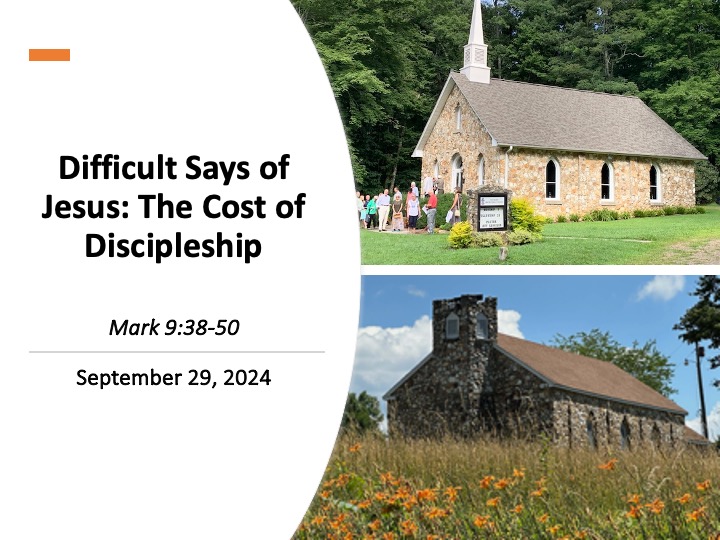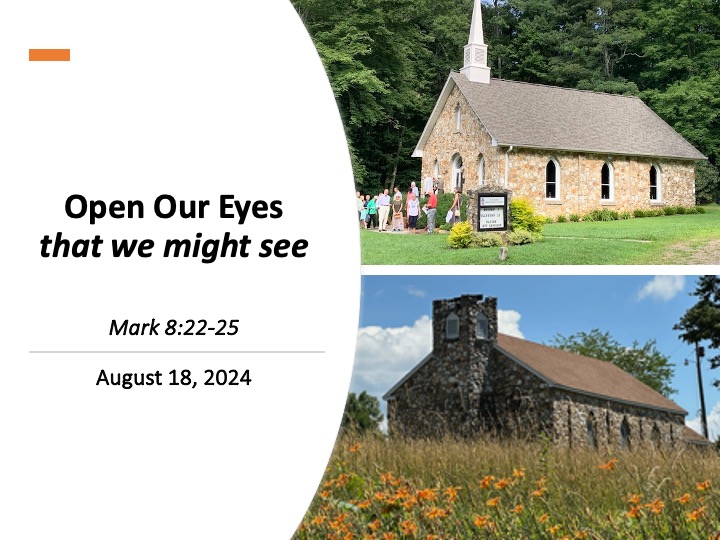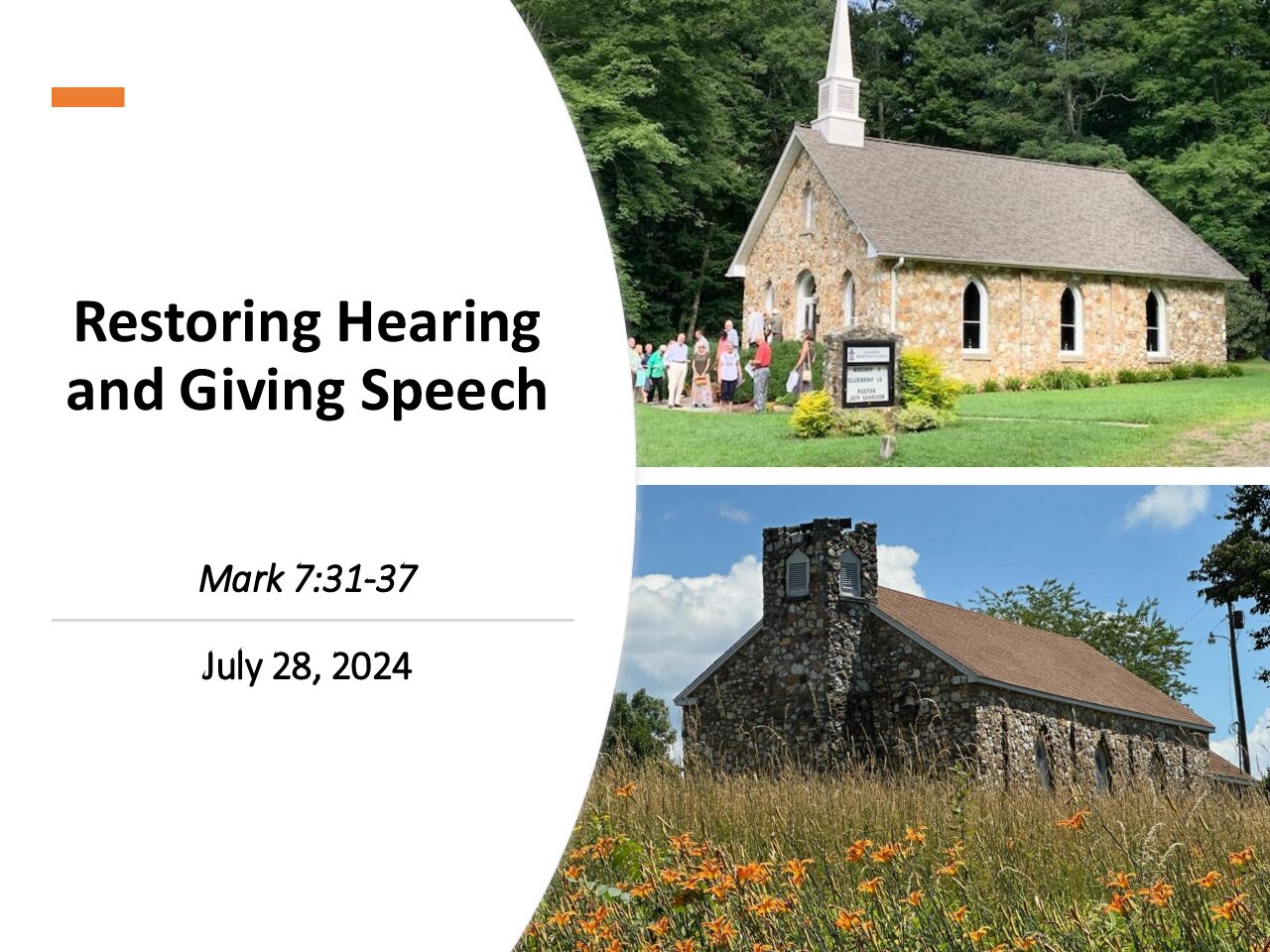I am supposed to be on vacation. The plan was to be in Pittsburgh, spending time at the Heinz museum, botanical gardens, the trolley museum in Washington, PA, Frank Lloyd Wright’s “Falling Waters,” and the Flight 93 monument. Hurricane Helene wasn’t in the plan. But that all changed. My replacement preacher for the morning lives along the New River, which is at a near record flood. She can’t leave her house and called me on Friday.
The storm changed tracks. We had high wind and lots of rain and the power was out for 36 hours, just coming back on yesterday evening. Many people are still without power. Thankfully, we’re all a lot better than those along the coast and in Western North Carolina and Eastern Tennessee. Our prayers go out for them.
So much for traveling. I sent word to JoAnn (the preacher who now lives on an inaccessible island), that I would pull out an old sermon and dust it off, since we weren’t going anywhere anyway… I first preached this sermon at First Presbyterian Church in Hastings, MI in 2006. Because of power failures, I do not have a video of the sermon, so you’ll just have to read it!
Jeff Garrison
Mayberry and Bluemont Churches
September 29, 2024
Mark 9:38-50
Comments at the beginning of worship:
Philip Gulley, a Quaker pastor, has a delightful book titled Front Porch Tales. In one story, tells about Doc Foster, a man in the town in which he was raised. Doc wasn’t a physician. He was the trash collector and the only black man in Gulley’s hometown.
For a dollar a week, he pulled up at our curb in his pickup truck, climbed out, threw our trash in the back, and drove away. If we forgot to set our trash out, he’d drive back to our barn and get it himself. When he had a truck full, he’d drive out to the town dump on Twin Bridges Road, unload, wet his finger, and put it in the air; if the wind wasn’t blowing toward town, he’d commence to burning…
Gulley goes on to tell of other “good deeds” done by Doc Foster such as helping college kids with their tuition so that there could be more teachers in the community. He sums up Doc’s work this way:
When out-of-town visitors would compliment us on our town’s cleanliness, we would swell with pride as if we ourselves had swept up the trash the dogs had scattered. Doc did what all good people do—made the rest of us look better than we really were.[1]
I like Gulley’s definition of a good person, one who makes everyone else look better. That’s what we as Christians are to be about.
Comments before reading the Scriptures:
We’re going to be looking at a couple of Jesus’ more difficult sayings this morning as we examine Mark 9:38-50. Jesus has just intervened into the disciples’ dispute over just who was going to be greatest; remember Jesus was always saying that if they wanted to be great, they’d have to first become a servant. Then, holding a child, he tells them that in welcoming a child, they welcome him. It’s a message the disciples obviously have a hard time grasping, as we’ll see by what happens next.
This is a difficult passage. It is the only passage in Mark’s gospel where Jesus mentions hellfire.[2] It’s important to note that hell isn’t for the unbeliever but the one who causes another to stumble. The passage appears to contain a patchwork of sayings, but the theme of the passage centers around humility and suffering demonstrated by word and deed.[3]
Read Mark 9:38-50
Twenty years ago, you may remember the shocking news out of Canyonlands National Park in Utah. A young solo hiker, Aron Ralston, whose arm had been trapped by a fallen boulder, saved himself by amputating his arm with his own pocketknife. He’d spent five days trapped in a three-foot slot canyon. With no hope of rescue and having run out of water; he felt he had no other option. Aron applied a tourniquet to this arm and performed the act. Then, with his good arm rigged up anchors and fixed a rope, he rappelled to the bottom of the canyon and hiked out.
Aron was not the first to perform such drastic measures to survive. In 1993 a fisherman in Colorado cut off his leg at the knee after being trapped by two large boulders while fishing alone in a remote canyon stream. Yelling for hours, no one heard his cries. With the weather deteriorating, he used hemostats from his fishing kit. He closed the severed arteries and veins and crawled half a mile back to his truck.[4]
Such incidents may cause us to wonder if we could do the same thing if in similar circumstances. Not long after Aron’s self-amputation, I was out visiting in Utah and went on an overnight backpack with Bruce, a friend through Ashdown Gorge Wilderness. My friend, an internal medicine physician, brought the topic up. Both of us have done a fair amount of solo hiking. “I don’t think I could do it,” Bruce said. I agreed, but then we both acknowledged such a position required drastic action. If you want to live, there may be no other choice.
And maybe that’s what Jesus is saying here. Sin, which leads to death, requires drastic action. Now I don’t think he means that we’re to cut off our hands or pluck out our eyes. After all, if you use such logic, that will mean that if your sin begins as a thought in your head, you should chop it off or at least sign up for a lobotomy. Obviously, Jesus’ intention isn’t to create a bunch of handicapped, self-mutilated Christians. That goes against Scripture’s teachings that our body is a temple in which we’re to invite God to dwell.[5]
Instead of taking this passage literally, we should figure out Jesus’ intention and what he’s trying to say.
Jesus uses outrageous examples to get his disciples attention and to force them to deal with their own sin and shortcomings. If we look at this passage, we’ll see Jesus extending charity to those considered “outsiders.” At the same time, he places a heavier burden on the “inside.” Another way of getting at this comes from another of Jesus’ saying. Take the log out of your own eyes before you try to get a speck out of someone’s else’s.[6] Let me explain.
Our passage starts with the disciples trying to look good. “Jesus,” John says, “we stopped this guy from using your name to expel demons. We knew he wasn’t one of us and he shouldn’t be doing that.”
The disciples expect a pat on the back from Jesus. “Well done good and faithful servants,” they hope to hear, “you’ve saved my good name.” But that’s not what they hear. Instead, Jesus tells them not to stop the guy. The rationalization is that someone who does good in his name ain’t likely to start badmouthing him. “He’s an ally,” Jesus essentially says.
Then Jesus gives two examples. If someone gives you a cup of water in my name, you’ll know they’re on our side and that God will notice their good deed. But if you give a hard time to one of these believers, or as the more familiar translation has it, “if you put a stumbling block in front of a little one who believes in me,” it’d be better that a millstone be fashioned to your neck, and you be thrown into the sea. Such a dreadful experience might have been on the disciples’ minds, for we know that the Romans used millstones to drown their enemies.[7]
The resulting consequences of these two actions seem out of portion. A cup of water gets a nod from God while tripping someone up (we’re not told that they fall, we’re just told that they are tripped) is so serious that we’d be better off dead. Again, Jesus extends charity to those outside his inner circle while setting a tougher standard for those close to him.
Then Jesus gives a series of hyperbolic demands. These commands are outrageous. They’re given not as an absolute requirement, but to make a point that we need to be concerned with our sin. “If your hand or foot causes you trouble, cut it off. If your eye distracts you, pluck it out.”
In other words, sin requires serious attention. Don’t be worrying about who’s in and who’s out, Jesus says. Don’t spend all your time worrying about the sins of others. Worry about yourself and what you can do to avoid sin. We can only change ourselves, we can’t change other folks, a lesson those of us who are married should have all learned by now, but the lesson doesn’t seem to sink in.
Then Jesus closes this section reminding us that everyone will be going through the “refiner’s fire.” Take actions to preserve yourself and, interestingly, as verse 50 ends, “Preserve the peace.” Preserve yourself and preserve peace! And interesting way to end this set of troubling teachings, don’t you think?
Salt in the ancient world was one of the few preservatives available. Fire, on the other hand, as used by the prophets, purifies. The impurities burn away. Jesus says that we’ll be preserved, but our impurities (or sin) will be burned away. Jesus may have thought back on the temple sacrifice which required both salt and fire. Applying this to the disciples, the two symbolize the trials and cost of discipleship. [8]
There are two sides to this passage and if we consider both, we see that Jesus urges his followers to go easy on others and to be hard on ourselves. If we do that, we’ll avoid being hypocritical, a problem that all who strive to be religious are infected with at one point or another in our spiritual development.
Let’s face it, churches must deal with hypocrisy. Sadly, you find it in our beloved rock churches. And every other church I know faces it. The problem extends, I believe, across the religious spectrum. When someone comes up with examples of hypocrisy in another church or even another religion, sometimes I want to laugh and ask, “Are we any better?”
If we’re harder on ourselves than on others, we’ll less likely take a hypocritical stance. Then not only will we be humble, but the church will also look more like what it’s supposed to look like. In church, people should care for one another and strive, like old Doc Foster, to make others look good.
Karl Barth, the great Swiss theologian, had a favorite story about a horseman who got lost in a snowstorm. Spurring his horse on, they galloped across a frozen lake. Later, in the comfort and warmth and safety of a home, he learns of his fool-hearted actions, of how he ran across thin ice. The man breaks down in horror and fright. In a way, we’re like that. Only after we’re saved do we recognize our peril.[9]
We should know the dangers. Maybe this is why Jesus presses harder on those close to him. We should know that sin leads to death, and that we’re all called to let our sins die on the cross as we accept God’s grace and love and forgiveness.
So, when you sit down to examine sin, go harder on yourselves than on others. But in the end, remember that we have a Savior who died that we might live. That’s the good news. Amen.
[1] Philip Gulley, Front Porch Tales (HarperSanFrancisco, 2001), 31-33.
[2] Douglas R. A. Hare, Westminster Bible Companion: Mark (Louisville, KY: WJK, 1996), 116. Hare points out that there are other passages which speak of punishment (8:38), but only here does he speak of hel.
[3] James R. Edwards, The Gospel of Mark (Grand Rapids, MI: Eerdmans, 2002), 282.
[4] Information on these two stories from http://hike.mountainzone.com/2003/news/html/030502_amputate-arm.html.
[5] 1 Corinthians 6:19
[6] Matthew 7:3-5 and Luke 6:41-42.
[7] William L. Lane, The New International Commentary on the New Testament: The Gospel of Mark (Grand Rapids, Eerdmans, 1974), 346.
[8] Edwards, 295-6
[9] Story told by Ralph Wood in Flannery O’Connor and the Christ-haunted South (Grand Rapids: Eerdmans, 2004), 152.



















